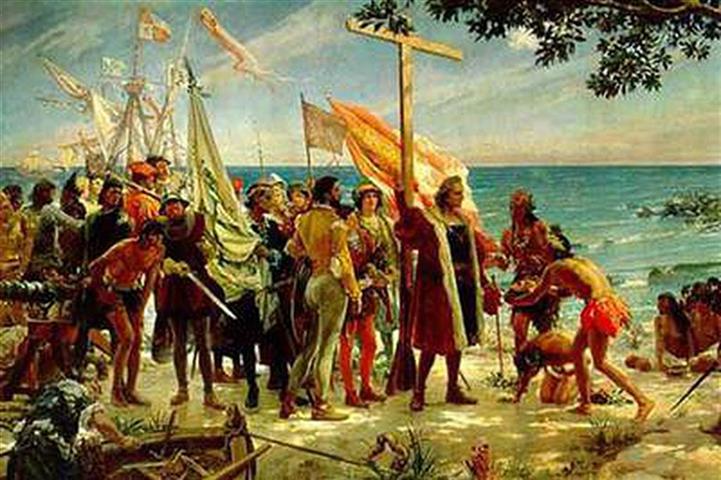Juan J. Paz and Miño Cepeda*, contributors to Prensa Latina
The world of the told story
Two decades ago, an incredible collection of 53 works from the “Chronicles of America” was published in Spain, in which authors such as Cristóbal Colón, Hernán Cortés or Pedro de Cieza de León and many other chroniclers and storytellers of the 16th century report on the conquest process and describe the life of the “Indians” on the entire continent. An extraordinary book, Guamán Poma de Ayala’s first Nueva corónica y buen gobierno (of which his famous drawings are best known) may have been written in the early 17th century, but the manuscript was discovered in 1909 and not published until 1936. This work changed the knowledge of the Inca Empire. It is impossible not to mention Fray Bartolomé de las Casas and his two seminal works, Very Brief Account of the Destruction of the Indies and The History of the Indies, from the mid-16th century, which describe the atrocities of Indian conquest and colonization.

Across the distances there are a multitude of researchers studying the indigenous world at the time of the conquest. Nathan Wachtel, in The Vanquished. The Indians of Peru before the Spanish conquest (1530-1570) made it clear that the culture of the Incas, so different from that of the “white” conquerors, was decisive for their own defeat. The Mexican Miguel León Portilla in Vision of the Vanquished. Indigenous Relations of the Conquest made clear what was happening in the Aztec city. In the long list of scholars I will at least cite John V. Murra or Waldemar Espinoza Soriano in her work on the Incas or Alberto Ruz Lhuillier on the Mayans and Josefina Oliva de Coll in The Indigenous Resistance to Conquest. Jorge Juan and Antonio de Ulloa, in their Secret News of America (1735), left a detailed account of the reality of colonialism in what are now the republics of Venezuela, Colombia, Ecuador, and Peru. But it is also worth mentioning Jacques Lafaye, who in Los conquistadores traced the vision that the group of these adventurers had at the other end when they arrived in indigenous lands, which they believed to not only be fulfilling a divine mission, but also to repeat the process of reconquest against the “Moors” in Spain.
There is therefore a compelling historical bibliography to understand without doubt or hesitation that the Conquest was a bloody process of subjugation and destruction of the Native American population. And, moreover, to understand that for Latin America colonialism marked the foundations of the “process of initial capital accumulation” studied by K. Marx in “Capital”, and that it was of great benefit to Europe, and also marked the underdevelopment of the region from which it was not yet possible to extricate itself.
the new story
In a new era of redefinition of international relations like the one we are currently living in and in which the historic rupture in US/European hegemony has begun, history is being reexamined to offer other approaches to salvaging the traditional situation. From the hand of academics and politicians identified with the right, both in Spain (and Portugal) and among the self-proclaimed “Hispanists” of Latin America, positions and studies have emerged that identify the conquerors as “liberators” of the peoples, because they were joined by sections of the Aztec or Inca nobility and thousands of indigenous peoples who had multiple reasons for rebelling against the internal ruling classes. However, they also claim that there is a “Hispanic community” based on the idea that colonialism never existed since these American lands are provinces of the motherland which ran a charity drive (https://rb.gy/vm6sh). They seek to deny trials that were not “black legends” but realities emerging from 16th-century writings.

In another recent study, highlighted by international press agencies and hailed as an attractive novelty for historical renewal, entitled “The Discovery of Europe”. Indigenous and Mestizo in the Old World (https://rb.gy/p6nfk) Esteban Mira Caballos describes, through a wealth of sources, how the arrival of the first indigenous peoples in Spain occurred (originally held as slaves); It also follows in the footsteps of ancient indigenous nobles who managed to move to Spain and examines the indigenous migrations (including mestizos) that created their own spaces of habitation and activity. Undoubtedly, it aims to highlight the socio-cultural contributions made by indigenous peoples in lands so far away, which Europeans themselves usually do not believe, let alone admit.
Among his various works, Mira Caballos has an earlier book: Conquest and Destruction of the Indies, 1492-1573, in which he acknowledges the brutal and destructive nature of conquest. But in relation to his most recent book, this historian has not failed to add a certain “Europeanizing” tendency, even going so far as to claim that the conquest, in short, was not such, but a process in which 95 percent of the “conquerors” were indigenous (https://rb.gy/gh3al); He points to the alliances of many nobles with the Spanish and observes former Curacas/Caciques becoming rulers of their own cities. In view of these statements, it is clear that the alliance that entire indigenous peoples formed to support and take advantage of the white conquerors is well known. But that does not make them “conquerors” intent on conquering the colonialist essence that Spanish/European whites wore when they served as instruments of mercantilist progress in the midst of the capitalist era.
Hence, the new Europeanizing mindsets of conquest and colonialism seek to minimize the brutal and destructive character of the process of conquest in Latin America and create an international community of equals, while the clear differentiation between the dominant North and the global South, dependent and dominated by central capitalist powers that used old colonialism to carve out their own development path from which Latin American countries were separated, has been an undeniable reality from the colonial era to the present.
rmh/jjpmc
*Ecuadorian historian and analyst
(taken from selected companies)

